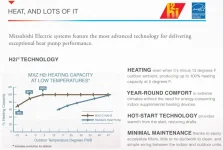I’ll take a temperature tomorrow morning when mine comes on when the outside temp hits 40 F.
When you guys are talking about the air temperature coming out of them, what exactly is that indicative of? And what heat pumps are you using? The older ones which do stink in colder temps, or the Mitsubishi one like I have in Maine, and linked to above with hyper heating technology?
attached picture from this pdf.
https://www.mitsubishicomfort.com/sites/default/files/manual/m-series_hyper-heat_brochure_3.pdf

